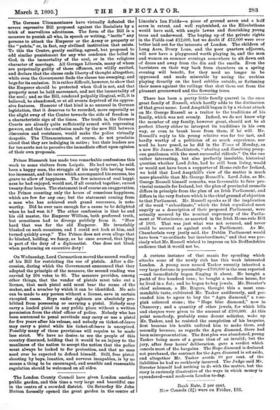There has been a pretty little family quarrel in the
once great family of Russell, which hardly adds to the distinction of that great name. Lord Ampth ill began it by a violent attack on Mr. George Russell as a traitor to the traditions of his family, which was not seemly. Indeed, we do not know why the member of any family, however great, should not be at perfect liberty either to interpret its traditions in his own way, or even to break loose from them, if he will. Mr. Russell's reply to his young relative was far too tart, and hardly worthy of a politician of so much experience, nor need he have posed, as he did in the Times of Monday, as a new Sir James Mackintosh, "abating and dissolving pomp- ous gentlemen with the most successful ridicule." On the one rather interesting, but also perfectly insoluble, historical question whether Lord John, had he still been living, would or would not have been a supporter of Home-rule for Ireland, we hold that Lord Ampthill's view of the matter is much more plausible than Mr. George Russell's. Lord John, as Mr. George Russell himself remarks, was favourable to four pro- vincial councils for Ireland, but the plan of provincial councils differs in principle from the plan of an Irish Parliament, and differs in the very feature which is the chief ground of objection to that Parliament. Mr. Russell speaks as if the implication of the word "subordinate," which the Irish repudiated most angrily as a description of their proposed Parliament, were actually secured by the nominal supremacy of the Parlia- ment at Westminster, as asserted in the Irish Home-rule Bill of 1893. That was just what was not secured, and never could be secured as against such a Parliament. As Mr. Chamberlain very justly said, the Dublin Parliament would have been "co-ordinate but insubordinate," and that was pre- cisely what Mr. Russell wished to impress on his Bedfordshire audience that it would not be.


































 Previous page
Previous page